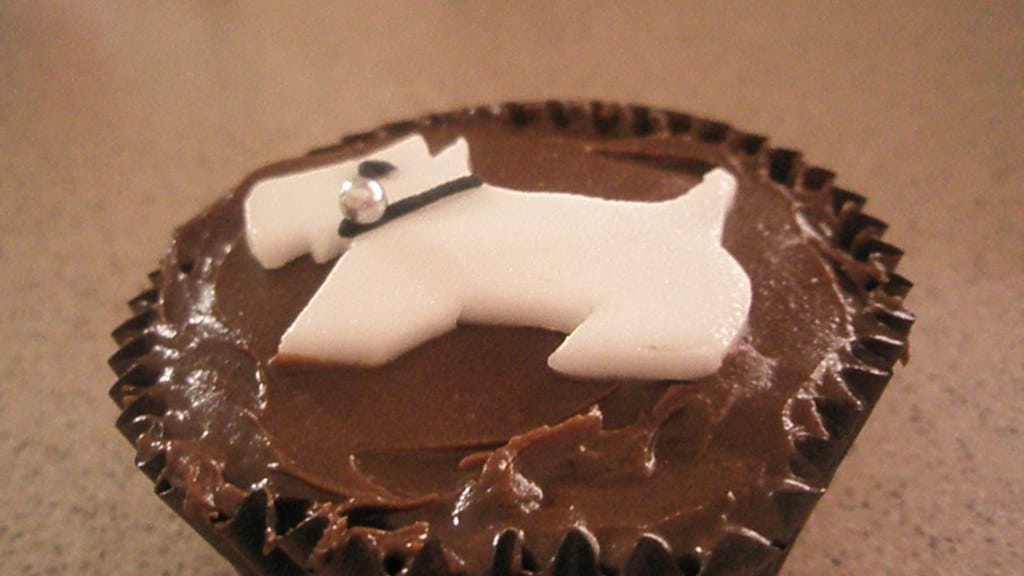Key Takeaways
- White chocolate is unlikely to cause “chocolate poisoning” due to the negligible amount of theobromine.
- High in fat and sugar, white chocolate can cause tummy upsets or even more serious illnesses.
- Older dogs, or those with existing health conditions, could still be at risk of theobromine toxicity.
You may know that dogs shouldn’t eat dark or milk chocolate due to the high levels of the chemical theobromine. Unlike us humans, dogs can’t metabolize this chemical; chocolate also contains caffeine, so it’s doubly problematic for our pooch friends.
Luckily, white chocolate has significantly less theobromine and caffeine than either milk or dark chocolates. This doesn’t make it safe. However, if your dog eats white chocolate, then contact your veterinarian or The Pet Poison Helpline at (855) 764-7661 immediately and follow their instructions.
Here we discuss why white chocolate is dangerous for our furiends and what to do if your dog eats some. Read on to find out why your best fur-iend shouldn’t be allowed white chocolate and what to expect when they’re at the veterinarian’s clinic.
If your dog has gotten into your white chocolate, we recommend contacting the Pet Poison Helpline at 800-213-6680 and your local DVM for advice and an emergency appointment for your furbaby.
How much white chocolate is toxic to dogs?
White chocolate contains about 0.25mg theobromine/oz of chocolate which is negligible compared to milk and dark chocolate. This means it’s extremely unlikely for white chocolate to cause traditional poisoning in the same way as other types of chocolate.
Small quantities are likely ok. However, toxicity has been reported at just 20mg/kg body weight. While just 20mg/kg body weight can cause, initial signs of toxicity, such as an upset tummy, doses over 40mg/kg can induce cardiac issues such as arrhythmias or high blood pressure. This means it’s certainly possible for your pooch to be poisoned if they manage to get into your stash.
The other danger of white chocolate is the high levels of cocoa butter and sugar that can cause upset tummies, hyperglycemia, and even pancreatitis. Pancreatitis is a painful inflammatory condition affecting the pancreas that could even lead to death in severe cases.
As white chocolate contains such a small amount of theobromine (0.25mg/oz chocolate), poisoning is rather rare. Remember 20mg theobromine/kg bodyweight is required to cause clinical signs in most dogs though less may cause problems for pooches with health problems. A larger concern for most pets that eat white chocolate are the high levels of cocoa butter and sugar that may cause pancreatitis.
What to do if my dog ate white chocolate?
The first thing to do if your dog eats white chocolate is to contact your veterinarian immediately. This will allow you to determine if your dog has eaten a toxic amount of theobromine. It will also allow immediate and preventative care to be instituted. This gives your dog the best chance of minimizing symptoms and a good prognosis.
Waiting for your dog to show signs can make it difficult to treat your dog effectively and also could negatively affect your dog’s health or even survival in severe cases. Don’t forget to bring the wrapper to your appointment, as it will allow your DVM to check for other toxic ingredients that may be in the chocolate, such as macadamia nuts or xylitol.
If your dog eats white chocolate, you should contact your DVM and check the wrapper to ensure there aren’t other toxic ingredients within the candy. Making an urgent veterinary appointment will allow rapid treatment of your dog and facilitate a rapid recovery.
When to see a vet?
You should contact your vet immediately if your dog has eaten white chocolate. While there are minimal non-fat cocoa solids in white chocolate, there is a small risk of theobromine toxicity. Also, some luxury white chocolate brands contain up to 35% cocoa solids. Most of these include fat and cocoa butter content, which could lead to vomiting, diarrhea, or even pancreatitis.
Don’t wait to see if your dog shows clinical signs, as then it may be too late to treat properly, and your dog may suffer abdominal pain, vomiting, and diarrhea alongside heart and kidney problems in severe cases.
What if my dog ate plenty of white chocolate but seems fine?
As the typical signs of chocolate poisoning take several hours to manifest, you may think your pooch is fine, but you should contact your veterinarian as your pooch may need medical intervention.
Your DVM will be able to help determine if your dog is at risk of theobromine toxicity or tummy upsets. Treatment before clinical signs start may actually prevent them from appearing.
The signs of chocolate poisoning can take hours to become apparent, but then it may be too late for some treatments, such as activated charcoal, to help prevent the absorption of the fat and theobromine into the bloodstream.
Signs that my got dog white chocolate poisoning
Clinical signs that your pup may have eaten white chocolate in large enough amounts to cause theobromine toxicity include restlessness, vomiting, diarrhea, increased thirst, and urination. More severe signs would include heart arrhythmias, seizures, muscle tremors, and even coma or death in rare instances.
Some signs that your dog may have eaten enough white chocolate for the high fat and sugar content to cause them problems are listed below:
- Vomiting
- Diarrhea
- Painful abdomen
- Fever
- Reduced appetite
- Depression
If your dog is diabetic, then eating white chocolate in any quantity is dangerous due to hyperglycemia which can cause depression, coma, and even death.
Signs of theobromine toxicity and pancreatitis can be similar and include vomiting and diarrhea. Other signs of pancreatitis include a painful abdomen, while diabetic dogs could slip into a coma due to hyperglycemia.
What happens to dogs that eat white chocolate?
Theobromine is in white chocolate in negligible quantities, just 0.25mg/oz, but it can still cause problems if eaten in sufficient quantities. Taking a few hours to be absorbed into the bloodstream, theobromine is also recycled within the body from your dog’s urinary bladder back into the blood. This means the toxic signs can persist for extended periods of time.
Aside from the toxicity of theobromine, the high fat and sugar levels put increased stress on the gastrointestinal system and cause inflammation of the pancreas. This inflammation leads to pain and gastrointestinal distress and can even be fatal in severe cases.
White chocolate contains small amounts of theobromine, but if eaten in large enough quantities, it can cause a racing heart rate, increased need to urinate and drink or inflame the pancreas and cause tummy upsets.
Why white chocolate is toxic to dogs?
The presence of theobromine means that white chocolate can be toxic to our fur babies. This is especially true of dogs with pre-existing health conditions or the elderly.
Theobromine acts as a stimulant for the heart, a relaxant to the muscles, and a diuretic on the kidneys, which means your dog will need to urinate more while they have a racing heart rate or arrhythmia.
White chocolate is toxic to most dogs in large quantities due to theobromine, particularly in elderly dogs or those with other health conditions. This is due to theobromine, high fat, and high sugar content.
How do vets treat white chocolate poisoning?
Treatment will depend on the amount of white chocolate eaten and also on the presence of other toxic ingredients within the chocolate treat. If your pooch has eaten the white chocolate within 2 hours, the first step is to begin inducing vomiting and then giving activated charcoal to minimize the absorption of ingredients into the bloodstream.
Gastroprotectant medications and antacids can then be administered to help manage vomiting and diarrhea. If sufficient amounts have been eaten, your DVM will also provide aggressive supportive treatments such as intravenous fluid therapy and pain medications. Your veterinarian may also administer insulin if persistent hyperglycemia is present in a diabetic patient.
Careful monitoring of your dog’s heart and nervous systems will also need to be carried out to determine if cardiac or anti-seizure medications are needed.
Your veterinarian will induce vomiting in the immediate period after your dog eats white chocolate and will then provide gastroprotectant medications to support your dog’s tummy. Other treatments will depend on the volume that your dog has eaten.
Final Woof
White chocolate may not typically be associated with theobromine toxicity, aka chocolate poisoning, but that doesn’t mean it’s safe for your pooch to consume. If your dog has eaten white chocolate, then check the wrapper and contact the Pet Poison Helpline at (855) 764-7661 to determine if they’ve eaten a toxic dose or if there were other dangerous ingredients, such as macadamia nuts in the candy.
You should also contact your veterinarian, especially if your dog has previously had pancreatitis or is diabetic. Any dogs with health conditions or those that are elderly should also be checked over and monitored. Luckily, chocolate poisoning is rarely fatal, particularly for dogs that have eaten white chocolate, but the fat and sugar content within white chocolate pose the equally dangerous threat of pancreatitis, so early intervention with your DVM is essential for their full recovery and continued good health.


